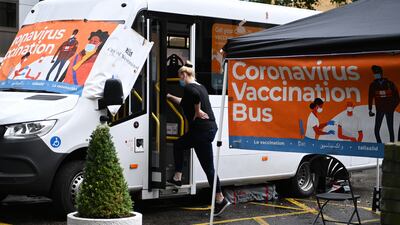Follow the latest updates on the Covid-19 pandemic here
Coronavirus protection provided by two of the most popular vaccines starts to wane within six months, research suggests.
It could mean protection for the elderly and healthcare workers could fall below 50 per cent by winter in the UK.
The analysis by the Zoe Covid Study of the Pfizer/BioNTech and the Oxford/AstraZeneca vaccines examined more than 1.2 million test results and participants.
“A reasonable worst-case scenario could see protection below 50 per cent for the elderly and healthcare workers by winter,” said lead scientist Professor Tim Spector.
“If high levels of infection in the UK, driven by loosened social restrictions and a highly transmissible variant, this scenario could mean increased hospitalisations and deaths.
“We urgently need to make plans for vaccine boosters, and based on vaccine resources, decide if a strategy to vaccinate children is sensible if our aim is to reduce deaths and hospital admissions.”
It is not unexpected for the vaccines to lose effectiveness over time but the Zoe study lays out how great the reduction is.
The Pfizer jab was 88 per cent effective at preventing Covid-19 infection a month after the second dose.
After five to six months the protection decreased to 74 per cent, suggesting protection fell 14 percentage points in four months.

Protection levels high
With the AstraZeneca vaccine, there was a protection against infection of 77 per cent one month after the second dose.
After four to five months protection decreased to 67 per cent, suggesting protection fell by 10 percentage points over three months.
“Waning protection is to be expected and is not a reason to not get vaccinated,” said Prof Spector.
“Vaccines still provide high levels of protection for the majority of the population, especially against the Delta variant, so we still need as many people as possible to get fully vaccinated.”
In the UK, vaccines were rolled out first to the elderly, vulnerable and health workers, meaning those groups are first likely to experience the waning effectiveness.
That suggests those people are more likely to be at increased risk of Covid-19 compared to those vaccinated more recently.
Watch waning 'very carefully'
Britain has started to plan for a vaccine booster campaign later this year after top a]dvisers said it might be necessary to give third shots to the elderly and most vulnerable from September.
The vaccines still offer good protection against serious illness, which is their “main objective”, said Professor Adam Finn, a member of the Joint Committee on Vaccination and Immunisation which advises the UK Government.
“[It’s] encouraging actually that people who’ve had two doses are still very much well protected against serious illness, which is our main objective.
“But we do need to watch out very carefully to see if this waning begins to translate into occurrence of more severe cases because then boosters will be needed.”
He said that offering a third dose to people with impaired immunity should be seen as trying to get them as protected as possible.
“We need to figure out who are the priority people to receive additional doses of vaccine,” he said.
“In this case it would be more a sort of third priming dose than the booster, in the sense that we’d be trying to get them to be protected or better protected than they already are with the two doses they’ve already had.”
The Zoe Covid Study developed an app to log vaccines and monitor real-world side-effects and effectiveness in its cohort of more than one million users.
Zoe used data from vaccines, which were logged from December 8, 2020, to July 3, and from infections which occurred between May 26, when the Delta variant became dominant, and July 31.
The results have been adjusted to give an average risk of infection reduction across the population.
While protection appears to decrease steadily, individual risk may vary due to individual variation in antibody duration, researchers say.


